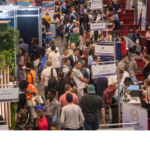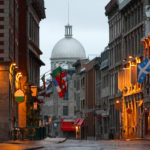The first few days after arrival can be confusing and stressful. Having a checklist for what you need to do can help you a lot.
In Canada, people always use Google to search, and the term – Google it – means it is very common in Canada. You can use Google and Google Maps for more information you need. For example, if you want to search for supermarkets around you, just search on Google Map: Grocery stores near me and then you can see the list of all nearby supermarkets and choose one of them.
For example, if you want to buy a device, it is better to research about it in Google and read people’s opinions about that product, especially if the product you are buying is expensive.
Note: Remember that for administrative work you always need to have a passport and a Study Permit / work Permit with you. In a number of administrative tasks such as obtaining a SIN number, insurance or driving licence, you must also have a lease contract with you, and if you are temporarily living somewhere, you must have a document that shows.
In this section, a brief explanation of the necessary initial steps is given, and you can refer to the help page by clicking on the link provided in some of these explanations.
A checklist of actions you need to take can be found below.
Temporary Visa health insurance during your stay in Canada
You must obtain the appropriate health insurance for your type of visa.
- Staying without health insurance can prevent you and your family members from renewing or converting their visas.
- In case of a medical problem, you will incur very high costs.
Students and tourist visa holders must provide their health insurance in advance for the principal applicant and all family members throughout their stay in Canada.
Individuals with a work or permanent residence visa must provide health insurance for the main applicant and all family members for the first 3 months, and can apply for Canadian government insurance after the first 3 months after arriving in Canada.
College or university health insurance costs are paid for independently through acquaintances in Canada or an exchange, and a receipt is sent to the RCIC for final submission.
Rent an apartment:
Accommodation is one of the biggest challenges facing any new immigrant. The best option for newcomers is to rent or short-term lease of a small house or a room of a house.
Once you know the city well and have a detailed plan, you can choose your place of residence according to your work or study or other elements, and then rent a place for a long time.
Guide link for home:
SIM cards:
To get a SIM card, there are various companies that offer SIM cards, and you can also buy mobile phones from these companies in installments.
To receive a SIM card, be sure to have the following documents with you:
- Passport
- Work permit / Study permit
- Visa
- Other identification documents (if available)
Bank account:
Bank account is another important thing that should be done in the first days of arrival. Before choosing your bank, it is better to research about the bank and see which bank is better for your situation.
For more information about Canadian banks you can visit the following help link:
https://innolinkcanada.com/en/guides/canadian-banks-list-guide/
Social Insurance Number (SIN):
The Social Insurance Number (SIN) is a unique 9-digit number assigned to each person. This number is used to identify people who work in Canada and people who need to take advantage of Canadian government benefits and services. All newcomers to Canada are required to request this number.
For more information on Sin number, you can enter the following link:
https://innolinkcanada.com/en/guides/sin-number-guide/
Health insurance:
Having a health card is very important for business owners and entrepreneurs, so when you first arrive in Canada, the first thing you need to do is apply for a Canada Health Card.
According to the law, every person must be covered by health insurance. This insurance and its related card, which covers all medical expenses (except medicine and ambulance costs for 911 calls), is one of the most essential documents that every resident of Quebec Province (like other provinces) needs. The card that is related to this health care insurance is known as the Maladie Card.
For more information, you can enter the following link:
https://innolinkcanada.com/en/guides/canada-health-card-guide/
Driving license:
A driving license is recognized in Canada as an identity document, and even if you do not want to drive, it is recommended that you obtain a driver’s license. In many offices and daily activities, you need an identity card, and until you receive permanent residency, you will not have any Canadian identity documents. To facilitate work and not have a passport with you, it is better to get your driver’s license.
For more information, you can enter the following link:
https://innolinkcanada.com/en/guides/canadian-driving-licence-guide/
Bus and metro card:
Getting a bus or metro card is one of the tasks that must be taken upon arrival. There are many tariffs for bus and metro cards and the laws of each province are different. To get a metro card and recharge it, you can go to the metro station and ask them for a metro card.
For more information on the Montreal Bus and Subway Card Guide, visit the link below:
https://innolinkcanada.com/en/guides/montreal-bus-and-metro-card-guide/


